Premium Only Content

Lesson 37 - Wars and Rumors of Wars 011620
The Bible Show
Lesson 37: Wars and Rumors of Wars 011620
01/16/2020
EvolutionPOP.com
01.) Matthew 24:1-2 (Temple totally destroyed).
03.) Matthew 24:3 (Three questions to Jesus).
02.) EyeWitnessToHistory.com
http://www.eyewitnesstohistory.com/jewishtemple.htm
The Romans Destroy the Temple at Jerusalem, 70 AD
(Reference "The Last 2 Million Years"; "Encyclopedia Britannica"; etc.)
In the year 66 AD the Jews of Judea rebelled against their Roman masters. In response, the Emperor Nero dispatched an army under the generalship of Vespasian to restore order. By the year 68, resistance in the northern part of the province had been eradicated and the Romans turned their full attention to the subjugation of Jerusalem. That same year, the Emperor Nero died by his own hand, creating a power vacuum in Rome. In the resultant chaos, Vespasian was declared Emperor and returned to the Imperial City. It fell to his son, Titus, to lead the remaining army in the assault on Jerusalem.
The Roman legions surrounded the city and began to slowly squeeze the life out of the Jewish stronghold. By the year 70, the attackers had breached Jerusalem's outer walls and began a systematic ransacking of the city. The assault culminated in the burning and destruction of the Temple that served as the center of Judaism.
In victory, the Romans slaughtered thousands. Of those sparred from death: thousands more were enslaved and sent to toil in the mines of Egypt, others were dispersed to arenas throughout the Empire to be butchered for the amusement of the public. The Temple's sacred relics were taken to Rome where they were displayed in celebration of the victory.
The rebellion sputtered on for another three years and was finally extinguished in 73 AD with the fall of the various pockets of resistance including the stronghold at Masada.
04.) Matthew 24:3-5 (Christians confess Christ, but deceive).
05.) Matthew 24:6-8 (Wars and rumors of wars).
06.) HistoryGuy.com
https://www.historyguy.com/new_and_recent_conflicts.html
New and Recent Conflicts of the World
-Current “Major” wars and conflicts
-Current “Minor” wars and conflicts
-Recently concluded or suspended wars and conflicts
-Major Acts of Terrorism
Current “Major” wars and conflicts in the world—Major conflicts are defined here as wars and conflicts in which more than a thousand people have died, involve more than one nation (for internal conflicts) or more than two nations (for international conflicts), and/or have the near-term potential to turn into a multi-national regional conflict. Alphabetical listing.
Afghan War (part of America’s world-wide War on Terrorism)--
Al-Aqsa Intifada (Israeli-Palestinian Conflict) (high-risk to become a regional war)--
Algerian Civil War—(1992-Present): After the Islamic Salvation Front won national elections in 1992, the military annulled the elections and the winning party's military wing, The Islamic Salvation Army (AIS), began a bloody rebellion. The AIS surrendered in June 1999, but other groups continue to fight the governme
Basque Separatist Conflict—(1958-Present): The rebel group called Basque Fatherland and Liberty guerrilla group (ETA) has waged an urban guerrilla movement against the Spanish government. The organization's goal is independence for the Basque region of northern Spain and southwestern France. Some operations have taken place in France, causing Paris and Madrid to cooperate. Approximately 800 deaths are attributed to the ETA's campaign.
Burma (Myanmar) Civil War—(1948-Present): In Earth's longest running and perhaps most complex conflict, several different ethnic groups attempted to secede in the years following World War 2. Most of these groups continue the struggle to this day, along with political dissidents who took up arms after a 1988 coup. Some areas of northern Burma have been controlled by Narco-guerrillas harvesting opium, which the government has attempted to halt. Military operations near border areas have brought both rebels and the Burmese government into occasional conflict with neighboring Thailand.
Burundi Civil War—(1994-Present): The Tutsi-dominated government is fighting Hutu rebels. The rebels use neighboring Congo as a base to launch attacks, thereby giving the Burundi government reason to involve itself in the Second Congolese War.
Colombian Civil War—(1964-Present): Marxist Guerrillas began a Cuban-inspired insurgency in the 1960s, which continued at a fairly low level until the 1990s, when the strength of the guerrilla groups increased due to their de facto alliance with narcotics-producing crime cartels. Over the past year (since 2001), the violence of the conflict has increased as the government realized that negotiations with the guerrillas were not leading to a peaceful solution. The United States is providing military and logistical support to the government.
Congo: Second Congolese War (This IS a regional war)—(1998-Present): Peace talks may soon end what has been called “Africa’s World War.” Congolese rebels, backed by Rwanda, Uganda and Burundi, seek the overthrow of President Kabila (the father was assassinated and his son then became president), who is supported by rebels from the above three countries, in addition to the armies of Angola, Zimbabwe and Namibia. Estimates put the number of dead in this war at over one million, mostly civilians. Also known as the “Great Lakes War.”
Chechnya (Russia): Second Chechen War--
Gaza War (2008-2009)
--Renewal of the Israeli-Hamas Conflict as Israel responded to Hamas rocket attacks with air and ground attacks beginning on December 27, 2008
No-Fly Zone War (Iraq-Coalition Conflict ( 1992-2003)
Israeli Airstrikes on Syrian Forces in Lebanon—Part of ongoing conflict between Israel and Syria in Lebanon. (high-risk to become a regional war)—
July 1, 2001: Israeli warplanes struck a Syrian Army radar post and anti-aircraft site in Lebanon in retaliation for a Hezbollah attack on the Israel-Lebanon border in an area called the Cheba Farms. Israel believes Syria controls the Hezbollah and struck the Syrians in order to "send a message."
April 15, 2001: Israel dropped six bombs on a Syrian Army radar post in Lebanon in retaliation for a Hezbollah attack on the Israel-Lebanon border. Israel believes Syria controls the Hezbollah. Three Syrian troops died in the attack.
Israeli –Syrian Border Clashes—Part of ongoing conflict between Israel and Syria in Lebanon. (high-risk to become a regional war)—
January 10, 2003: Israeli troops shot and killed one Syrian soldier and captured another in an apparent attempt by the Syrian soldiers to infiltrate across the border into the Israeli-occupied Golan Heights. Approximately one hour after the initial shooting, a Syrian outpost opened fire on Israeli forces. Israel chose not to respond for fear of escalating the violence. Isael later turned over the body of the dead soldier and the prisoner to the United Nations for transfer back to Syria.
July, 1991: Three Syrians, members of a military intellegence unit, infiltrated into Israeli-Occupied territory near Mount Hermon. They fired an anitank weapon at an Israeli military outpost, killing one Israeli soldier.
Israeli-Palestinian Conflict-àSee Al-Aqsa Intifada (above)-- (high-risk to become a regional war)—
Gaza Strip Conflict/Gaza War
Ivory Coast (Cote d’Ivorie) Civil War—(Sept. 19, 2002-2007): Rebel soldiers (who later called themselves the Patriotic Movement of Ivory Coast (MPCI) launched a coordinated, nation-wide attack on forces loyal to President Laurent Gbagbo. Loyalist forces held onto the capital city of Abidjan, but lost control of the northern cities of Bouake and Korhogo. Initial reports had former military dictator General Robert Guei as the leader of the coup. It was also reported that he perished in the fighting. Ivory Coast has seen ethnic and religious violence since 2000 between northern Muslims (such as Guei) and southern Christians (such as President Gbagbo). The government also claims that rebel reinforcement entered the country from a bordering nation, most likely Burkina Faso to the north. Tensions have increased between the two West African nations partly as a result of the status of millions of migrant Burkina Faso citizens living in Ivory Coast seeking jobs. A cease-fire began on Oct. 17, which held until the last week of November, as government forces launched a new offensive with recently acquired helicopters and what appeared to be a unit of English-speaking mercenaries. Also, a new rebel group appeared, seizing several towns along the western border with Liberia. This group, calling itself the Ivorian Popular Movement for the Greater West, clashed with French peacekeeping forces that were attempting to evacuate Europeans from the area. This Yacouba-based tribal group, which appears to include some Liberians, may be connected to one of the factions involved in the Liberian Civil War. A second western rebel group, called the Movement for Justice and Peace, appears loyal to the late General Guei.
Kashmir Conflict (high-risk to become a regional war)—(1991-Present): Kashmir is divided between India and Pakistan, and a Kashmiri rebel movement is aided by Pakistan. Intermittent clashes along the border nearly turned into full-scale war in the summer of 1999 and in late 2001.
Intense Clashes Along the LOC-- (Dec. 23, 2001-Continuing): Following the terrorist attack on India's Parliament, tensions between India and Pakistan increased, with machine gun, mortar and artillery fire across their border (Line of Control) in disputed Kashmir.
Terrorist/Rebel Attack on the Indian Parliament in New Delhi—( Dec. 13, 2001): Kashmiri Terrorists attacked the Indian Parliament, attempting to blow it up during a legislative session. Security guard killed the militants before they could enter the Parliament building. 5 terrorists and 7 Indian security officers and 2 Indian bystanders were killed in the attack. This attack triggered a violent confrontation along the Line of Control (LOC) in Kashmir between the armies of India and Pakistan. India blamed Pakistan for aiding the rebels
Liberian Civil War--
Nepal Civil War—(Feb. 13, 1996- Present): Maoist Guerrillas seek to overthrow the Nepal monarchy though a rural uprising. This conflict has grown in intensity in recent months. Chinese aid to the rebels is alleged.
North Lebanon Conflict (2007)--Fighting between the Lebanese government and a Jihadist Palestinian militia calling itself Fatah al-Islam.
Northern Ireland Conflict—(1969-Present): This is the latest in a very long series of conflicts fought by Britain in Ireland. Northern Ireland is a part of the United Kingdom, with a Protestant majority loyal to London. The Irish Catholic minority has sought to break away and join the Irish Republic in the southern part of the island. The IRA and other groups have conducted a largely urban guerrilla campaign since 1969. Protestant para-military groups also wage an underground war against the Catholic population. Peace talks have been under way for some time. Over 2,500 deaths have occurred since1969.
Philippines Conflicts—
Muslim Rebellion in the Southern Philippines--(1969-Present): Muslim rebel groups seek autonomy/independence from the mostly Christian Philippines. One rebel group, the Abu Sayaf Group, is believed linked to Osama bin-Laden’s Al-Qaida. This connection, plus their tactic of kidnapping and beheading Americans, led the United States to send Special Forces to aid the Philippine Army.
New People’s Army Rebellion--(1969-Present): The Communist New People’s Army (along with the rival Alex Boncayao Brigade (ABB); is attempting to overthrow the Philippine government and install a Marxist regime.
Rwandan Civil War—(1994-Present): The current Rwandan government is dominated by the Tutsi tribe, which overthrew the old government dominated by the Hutu tribe. Before losing power, the Hutu rulers and their militia massacred over half a million people. The Hutus now conduct a guerrilla war against the Tutsi government from bases in the Congo. Rwanda used the presence of these Hutu guerrillas to take part in both of the recent Congolese Wars.
Sri Lankan Civil War—(1983-Present): Sri Lanka's civil war is due to problems between the Tamil minority and the Sinhalese majority. In the 1980's, India intervened on the government's side, but has since withdrawn its troops. Over 70,000 deaths have resulted from this war. Peace talks have been under way for some time.
Sudanese Civil War—(1983-Present): This is a war based largely on racial, religious and regional differences. The government is dominated by Muslim Arabs, while the south of the country is largely black Christian.
War on Terrorism—Officially beginning Oct. 7, 2001, this American-led crusade against al-Qaida thus far involves: the campaign against al-Qaida and the Taliban in Afghanistan, the search by U.S. and Pakistani forces for al-Qaida followers in Pakistan, the deployment of U.S. special forces to aid government forces in the Philippines battle the Abu Sayyaf guerrillas on the southern Philippine island of Bamiyan, the deployment of U.S. special forces to Yemen to train and aid government forces dealing with rural tribes possibly allied with al-Qaida and the deployment of U.S. special forces to the republic of Georgia to train and aid government forces against rebels. Other military, para-military and covert missions are probably ongoing, but not yet public.
Ugandan Civil War (1980-2017)
http://war-memorial.net/Uganda-Civil-War--3.182
Years: 1980-2017
Battle deaths: 120,322 [1]
Non-state conflict, battle-deaths: 98 [3]
One-sided violence: 8,627 [2]
Nation(s) involved and/or conflict territory [note]
Uganda, Tanzania, Sudan
07.) Matthew 24:7-8 (Famines, pestilences, and earthquakes).
08.) Famines
OurWorldInData.org
https://ourworldindata.org/famines
A famine is an acute episode of extreme hunger that results in excess mortality due to starvation or hunger-induced diseases.
Pestilences
CDC.gov
Centers for Disease Control
https://www.cdc.gov/outbreaks/index.html
WHO.int
World Health Organization
https://www.who.int/emergencies/diseases/en/
Earthquakes
EarthquakeTrack.com
https://earthquaketrack.com/recent
There have been: (M1.5 or greater) as of 9am CT on 01/16/2020
124 earthquakes in the past 24 hours
1,213 earthquakes in the past 7 days
5,473 earthquakes in the past 30 days
60,328 earthquakes in the past 365 days
The biggest earthquakes:
today: 5.5 in North Of Ascension Island
this week: 5.9 in Maria Antonia, Guanica, Puerto Rico
this month: 6.4 in Tallaboa, Penuelas, Puerto Rico
this year: 8.0 in Lagunas, Loreto, Peru
09.) Matthew 24:9-12 (Saints killed and iniquity abounds).
10.) Merriam Webster Dictionary: Iniquity - The quality of being unfair or evil; Something that is unfair or evil; Gross injustice; Wickedness; A wicked act or thing; Sin.
11.) Matthew 24:13-28 (Abomination of desolation brings tribulation).
12.) Daniel 8:1-27 (The little horn waxes great).
13.) Revelation 9:13-19 (Army of Two hundred thousand thousand).
14.) Revelation 16:12-16 (Armageddon).
15.) Matthew 24:29-31 (The Lord comes after the tribulation).
16.) Zechariah 14:1-9 (The Lord shall be king over entire earth).
17.) Matthew 24:32-51 (Watch for these signs).
-
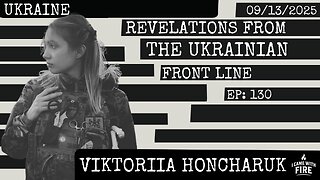 LIVE
LIVE
I_Came_With_Fire_Podcast
8 hours agoRevelations from the Ukrainian Front Lines
564 watching -
 52:56
52:56
X22 Report
4 hours agoMr & Mrs X - Big Pharma Vaccine/Drug Agenda Is Being Exposed To The People - Ep 7
44.3K16 -
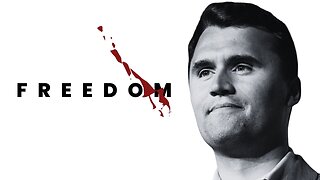 1:41:59
1:41:59
THE Bitcoin Podcast with Walker America
9 hours ago $12.54 earnedThe Assassination of Charlie Kirk | Walker America, American Hodl, Erik Cason, Guy Swann
24.7K18 -
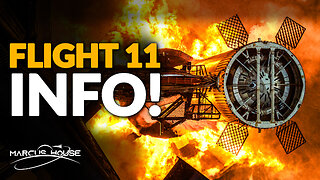 21:33
21:33
marcushouse
3 hours ago $0.31 earnedSpaceX Just Revealed the Plan for Starship Flight 11! 🚀
2.07K4 -
 35:03
35:03
Clownfish TV
6 hours ago'Live by the Sword, Die by the Sword.' | Clownfish TV
3.94K43 -
 8:15
8:15
Sideserf Cake Studio
2 hours agoA Hyperrealistic TAKIS Cake?
2.74K1 -
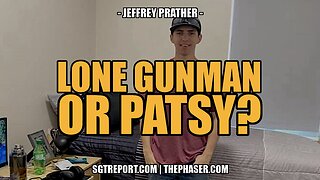 55:49
55:49
SGT Report
14 hours agoFAKED TRAGEDY, LONE GUNMAN OR PATSY? -- Jeffrey Prather
19.4K123 -
 9:30
9:30
Adam Does Movies
12 hours ago $0.08 earnedThe Long Walk - Movie Review
2.25K -
 2:28
2:28
WildCreatures
14 days ago $0.30 earnedNature's struggle for survival: Water snake devours mudpuppy
4.23K3 -
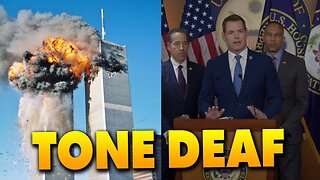 1:07
1:07
Memology 101
14 hours ago $0.13 earnedEric Swallowswell compares January 6th to 9/11 and Pearl Harbor
2.6K15